If you know that an ancestor spent time in a hospital or asylum it can be fascinating to find out what records might survive for the hospital or institution that they were admitted to.
There were various kinds of healthcare before the NHS – private institutions, charitable hospitals or dispensaries, and those operated through the local Poor Law. The 1808 County Asylums Act and 1845 Lunacy Act established statutory public lunatic asylums. As a result, records tend to reside at local and county archives – indeed the London Metropolitan Archives has material from 80 hospitals.
Remember there are hospital and asylum records that feature both staff and patients. Remember that while staff records may be open to all, most patient records are closed for 100 years. And if you are interested in the careers of nurses, doctors or surgeons, there are various resources relating to the training and education of medical professionals.
1. The Wellcome Library
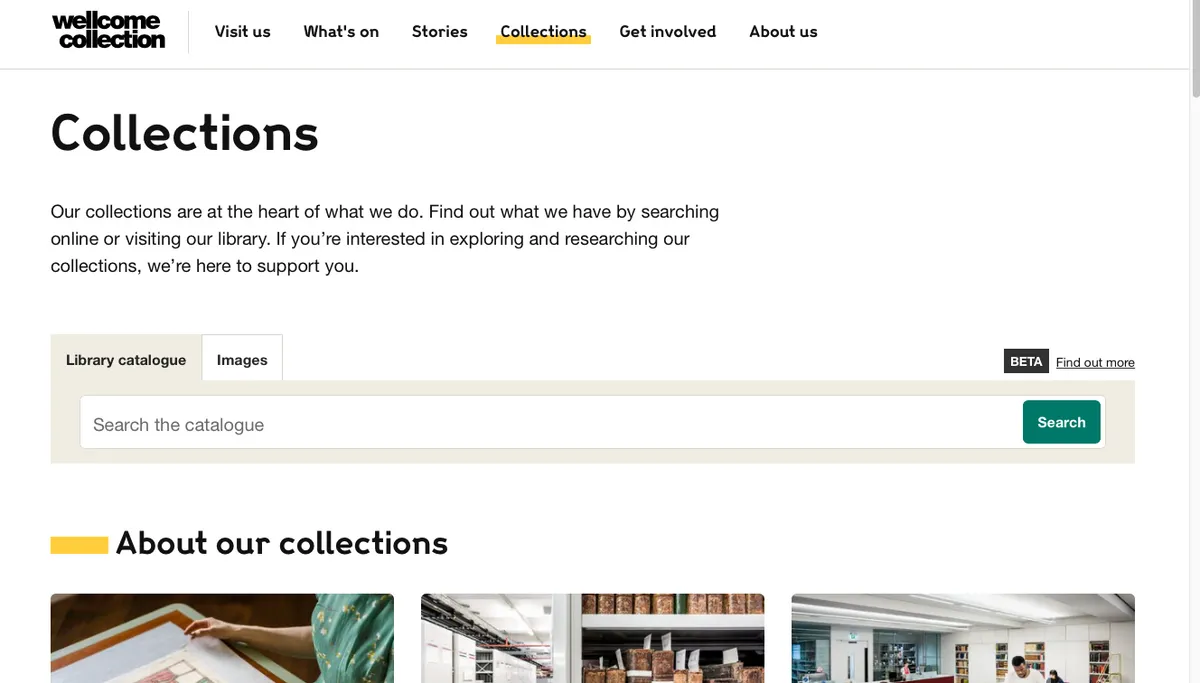
The Wellcome Trust sits behind a host of mass-digitisation, cataloguing and heritage projects relating to the history of healthcare, medical heritage and treatment. Its new search facility lets you search either the library catalogue or digitised images. You can then filter your search to pinpoint relevant material including an option just to see material that is online. Many asylum records have been added to the site as part of a mental health digitisation project so it is worth searching for an asylum or hospital that you know an ancestor was at to see what is available. The site is also home to countless articles, exhibitions, image collections and ready-digitised archives.
2. Historical Hospital Admission Records Project
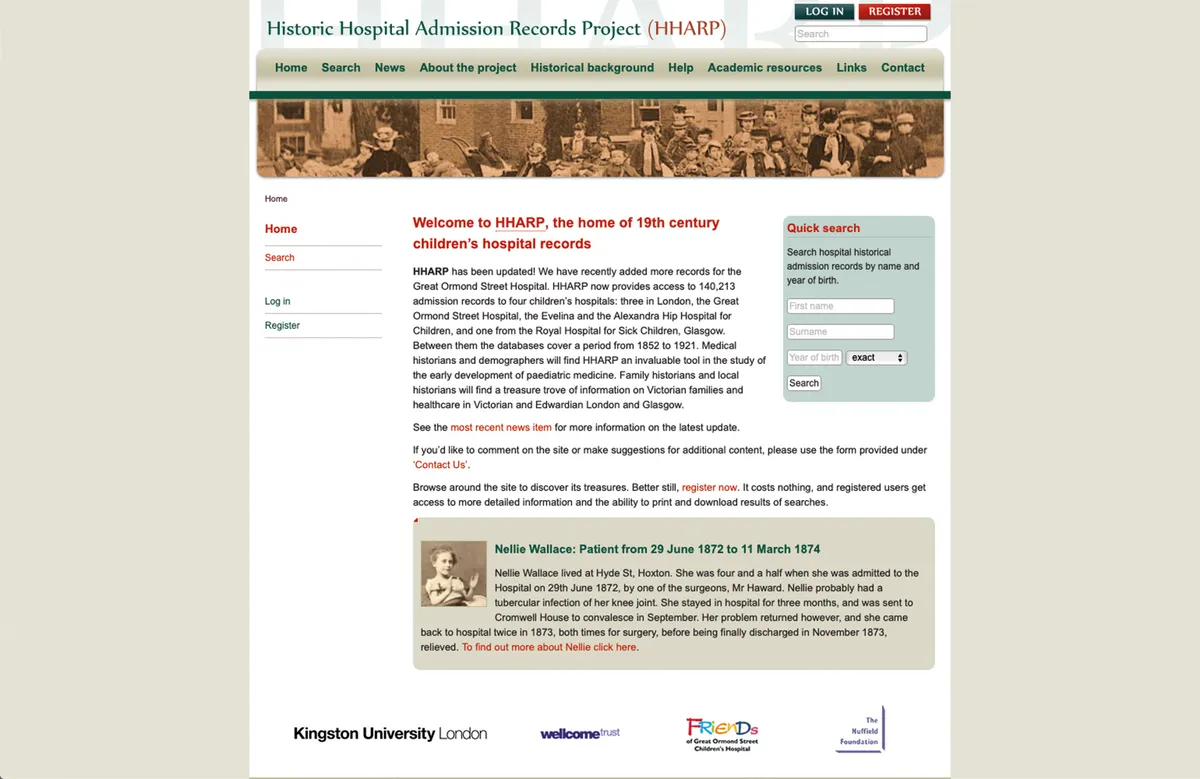
This long-running website houses details of more than 140,000 children admitted to four hospitals in London and Glasgow between 1852 and 1921. The records tell you the name and age of the child, where they came from, and the date and reason for their admission. More recent additions include admission records from the Royal Hospital for Sick Children in Glasgow, which joined entries from the Hospital for Sick Children at Great Ormond Street, the Evelina Hospital and the Alexandra Hospital for Children with Hip Disease. Basic searches return various results, but you will need to register to see more detailed material such as case notes.
3. Hospital Records
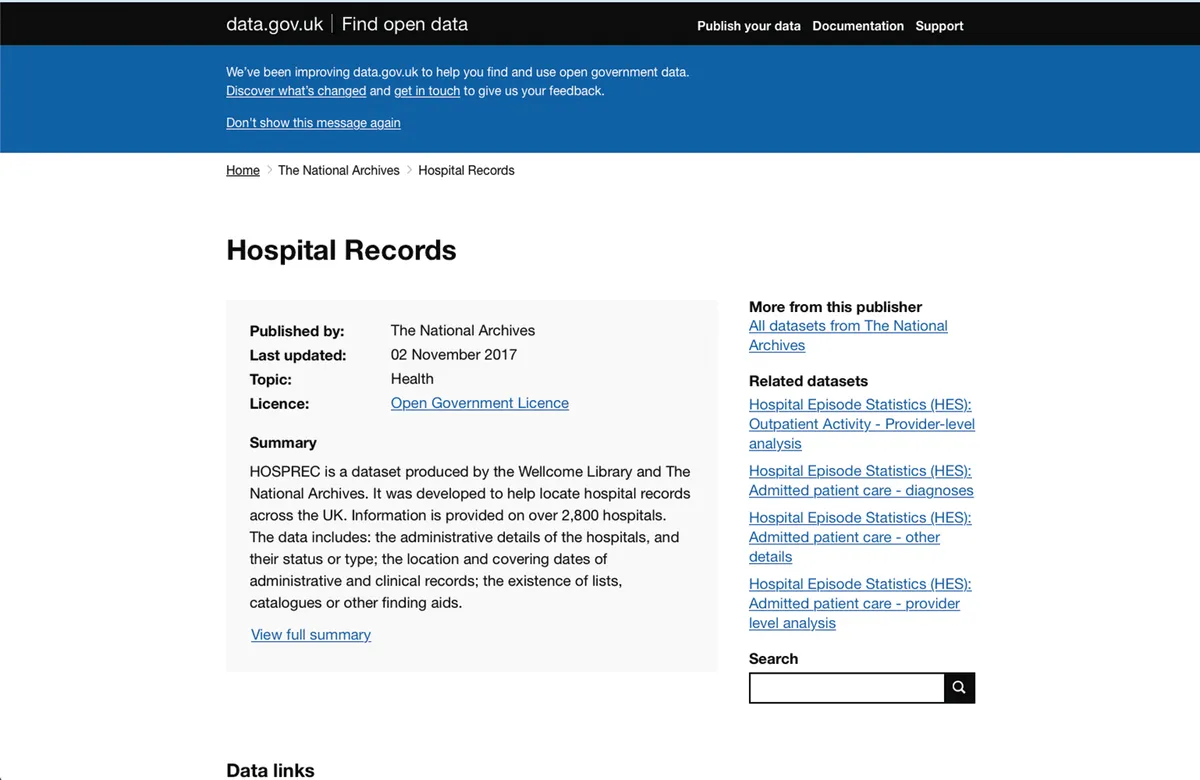
The free website Data.gov.uk publishes a range of data held by central Government, local authorities and public bodies. This particular page reproduces information from the mothballed Hospital Records Database created by The National Archives and Wellcome Library. It was developed to help locate records from more than 2,800 hospitals across the UK, and includes administrative details of the hospitals; their status or type; their location; and the dates of available administrative and clinical records. You should also be able to see if there are any lists, catalogues or other finding aids relating to the hospital you are researching.
4. Museum of the Mind
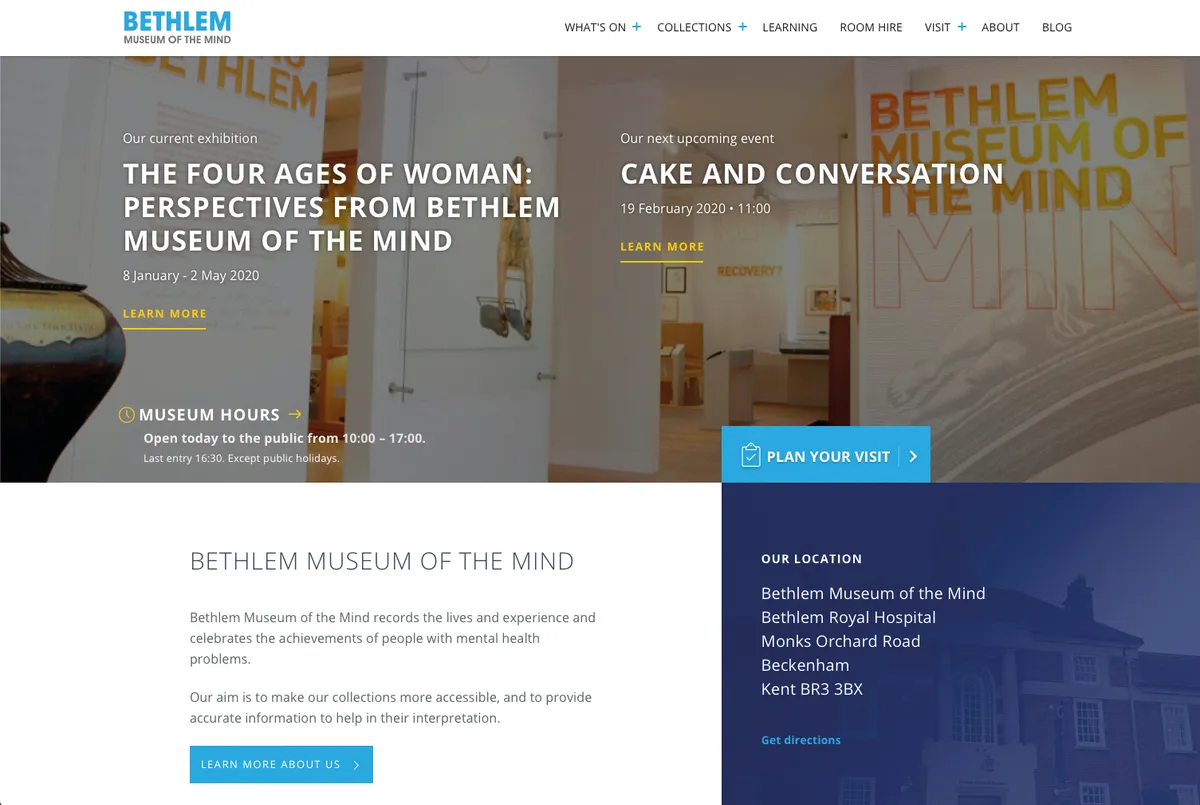
The Museum of the Mind preserves the archives of three London psychiatric hospitals: Bethlem Royal Hospital, Maudsley Hospital and Warlingham Park Hospital. Via the catalogue you can view digital images of selected documents, and get to grips with the kinds of records that survive for staff. These include registers, salary books, conduct records and pension schemes, as well as minutes and papers relating to social and sports clubs. It’s always worth seeing if records of the hospital that interests you have been made available via commercial partners – many of the staff and patient records held here can be accessed on Findmypast.
5. The Retreat Archive
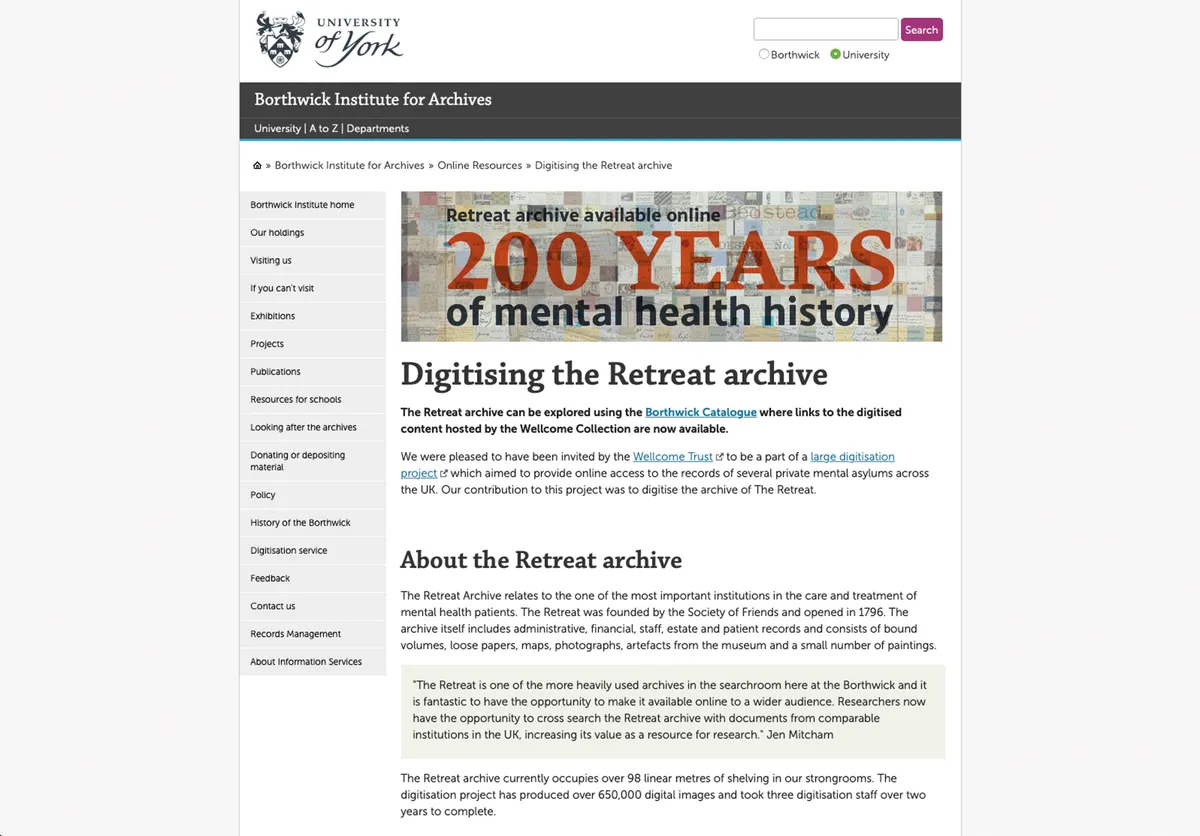
The Borthwick Institute for Archives holds a wide range of important collections, not least the archive of The Retreat, a pioneering mental heath hospital that opened in York in 1796. Here you can explore more than 650,000 digitised images hosted by the Wellcome Collection via the Borthwick Catalogue. The archive is unusually complete and includes administrative, financial, staff, estate and patient records, and consists of bound volumes, loose papers, maps, photographs and paintings. Note that patient records dating from 1920 to the present day were excluded from the digitisation project, for reasons of data protection.
6. Expert's choice: Patients of Porwick Hospital 1852-1916
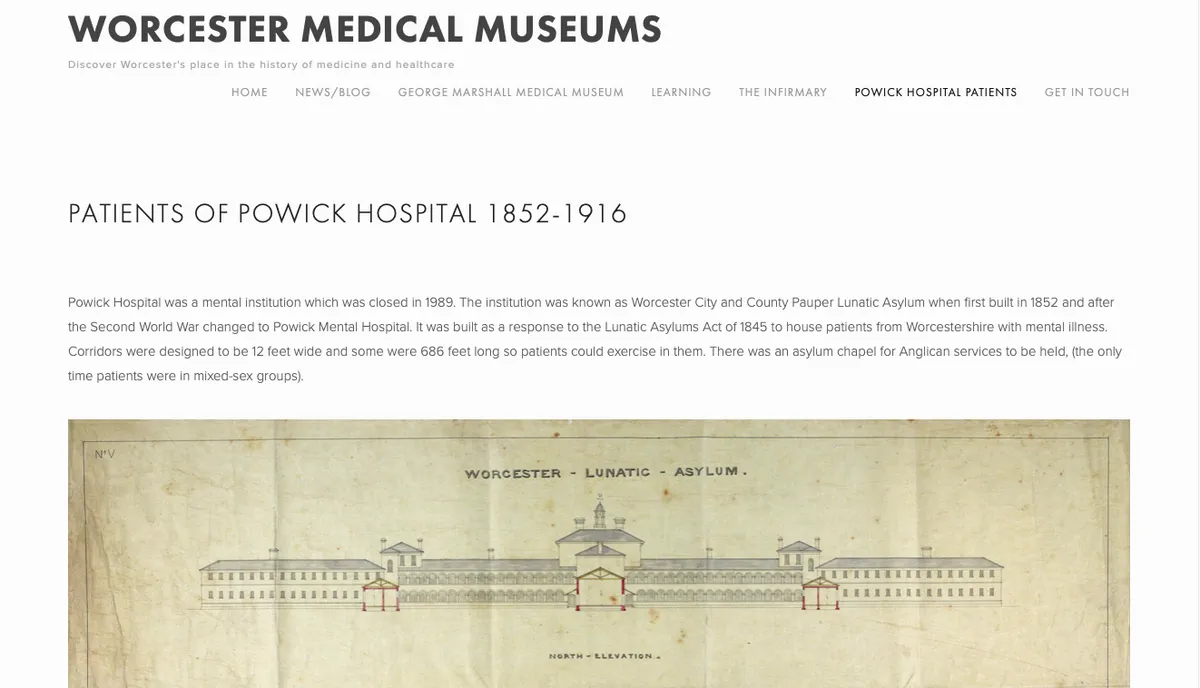
Chosen by Michelle Higgs, author of Tracing Your Ancestors in Lunatic Asylums:
"If any of your ancestors spent time in a lunatic asylum, the institution’s patients’ records can not only shed light on the reason for admission and their treatment – they may also go into valuable detail about family relationships, and how the patient’s behaviour changed when he or she became ill. More and more lunatic asylum records are now being digitised and made available online, either on the various genealogy subscription sites or on independent websites. One of my favourite examples is the Patients of Powick Hospital 1852–1916 database on the Worcester Medical Museums website.
"Powick Hospital was the Worcester City and County Pauper Lunatic Asylum, opened in 1852. Although it was built for patients from Worcestershire, its intake included those from the surrounding counties, Wales and further afield. Since the institution was for paupers, it was used extensively by a wide range of Poor Law unions.
"The database, which is free to access, was created by Dr Frank Crompton who transcribed case notes from more than 9,000 patients. You can search by name, occupation, abode or mental disorder. If your ancestor was treated at Powick, the database gives the date of their admission and the date of their discharge, their occupation, their abode, their disorder and from where they were sent. A massive bonus of this resource is that many of the case notes have been scanned and are available as images, so that you can read full details of a patient’s condition, treatment and progress on the way to their eventual recovery (in the best-case scenario). This can shed valuable light on any of your relations who suffered from the same condition, even if they were treated elsewhere."
More websites for hospital and asylum records
7. High Royds Hospital
Learn more about the former West Riding Pauper Lunatic Asylum.
8. Lincolnshire Hospitals
Casebooks for the Lawn Hospital, Lincoln, and St John’s Hospital, Bracebridge Heath (formerly the Lincolnshire County Lunatic Asylum), are now available to view on Lincolnshire Archives’ website.
9. Lothian Health Services Archive
This website has all sorts of useful advice about researching both staff and patients at hospitals.
10. Medical Registers and Directories
This Ancestry/Wellcome Library offering can help you trace health professionals in a number of registers, directories and other sources.
11. The National Archives
TNA has produced a quick guide to researching hospital records that’s a good place to start.
12. Prestwich Asylum Admissions
Search 22,722 admissions to Prestwich Asylum, from its opening in January 1851 up to 1901.
13. Staffordshire’s Asylums
This project investigates patients’ experiences at Staffordshire’s three county asylums: Stafford, Burntwood and Cheddleton (1818–1960).
14. Voluntary Hospitals Database
This website provides statistical data from voluntary hospitals in Britain and Ireland between the 1890s and 1940s.
Jonathan Scott is the author of A Dictionary of Family History









